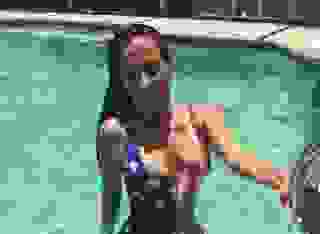Note: You can change font size, font face, and turn on dark mode by clicking the "A" icon tab in the Story Info Box.
You can temporarily switch back to a Classic Literotica® experience during our ongoing public Beta testing. Please consider leaving feedback on issues you experience or suggest improvements.
Click here"No, not really. Things will work out as they're meant to."
He looked at her, looked at the serenity on her face.
"Some mistakes, dearest, we never stop paying for," she said.
"Yeah, but I think I said once we can learn from our mistakes. At least I'd like to think we can."
"Maybe so. We're gonna find out. Soon."
"Yeah?"
"I need you to call my mother."
___________
He met Joan's mother at the airport late the next afternoon. He knew just by looking at the woman that she Joan's mother. The same jet black hair, though turning silver in places, the same eyes - though they were brutally cold, and decidedly aloof - she was Joan in pain writ large and stretched to the breaking point. He greeted Mrs Jennifer Dickenson as politely as he could and gave her right hand a firm shake, but the woman remained distant and cold. She remained silent all through the terminal, though once outside in the fading daylight she tried briefly to make small-talk about the flight and the weather - anything, it seemed but the nature of her duty here. They made their way to Alan's car and were soon driving toward downtown, and the hospital. There was a wall in the air between them, and the longer they drove the more ridiculous it became. Finally . . .
"How is she, Alan?"
"I don't mean to be evasive, but I'm not really sure. The nurses seemed kinda optimistic this morning, but Joan was decidedly less so. Maybe she's just depressed, or maybe the docs have told her something the nurses don't know - yet. I don't know, maybe she'll tell you more than she's told me . . ."
"I wouldn't count on that. How did you two meet?"
Alan recounted the burglary, the shooting, taking her to dinner. He told her a condensed version of their brief affair and split-up."
"So, you're a cop?"
"Yes, Ma'am."
"Interesting. Joanie's dad was a cop, though only for a few years, when she was very young. I guess it made an impression . . ."
"I didn't know that. Where's he now?"
"Oh, he passed away several years ago. AIDS. He developed a taste for other things."
"I see," Burnett said as he listened to the coldness underlying the woman's voice. "Have you remarried?"
She tossed out a sharp little cackle. "Not on your life! Never make the same mistake twice."
Burnett flinched at the irony in her words.
"So, when's the last time you saw Joanie? She hasn't really talked much about you, and didn't want to call you at first, actually, she only just yesterday asked that I call you."
"How long has she been ill?" Mrs Dickenson was good at evading painful associations, too, he noted.
"About four months. The initial diagnosis was breast cancer, but it had already spread to some lymph nodes around her right shoulder."
"Did they take her breast?" she asked, and Alan heard a tremble in her voice.
"Yeah, well, they did a full radical mastectomy . . ."
"They took them both! But . . . but why?" The woman seemed angry and surprised.
"You'll have to ask someone else that question, Ma'am. That's a little outta my line."
For the rest of the drive into town Mrs Dickenson remained quiet and defensive, her arms crossed over her breasts as if to ward off dark spirits that had gathered in the air before her worn body. Burnett looked over at her from time to time as he drove, noticed an almost childlike quality that seemed embedded with the air of denial the woman possessed, and he thought she looked as if she might break out in tears at any moment as the car approached the hospital. As he thought about this new woman he saw how fragile life was, and he found the thought crushing. Did we all make bargains.
But of course you know you do.
They rode up to the fourth floor together in silence, and Burnett walked beside the older woman down the pale green hall past the nurse's station to Joan's room. He knocked on the door, and when he heard a faint noise he poked his head in. Joan was with a nurse who held a pink plastic container under her mouth to catch vomit that seemed to issue from nothingness and reach out for solace from the illness within. He felt himself pushed aside as Joan's mother rushed inside. Without saying a word she went to the sink in the bathroom and a moment later came out with a damp washcloth and with that in hand she went to her daughter's side. The mother sat on the side of the bed and held the damp rag on the back of her daughter's neck.
After a few minutes the episode passed, and Joan lay back exhausted, sweat running down her face, the pale blue gown she wore soaked through with sweat and vomit. Mrs Dickenson ran her fingers through her daughter's hair, wiped the sweat away with the washcloth. For a brief moment mother and daughter seemed fused in time - they were one - and in the silence of this infinite confusion each seemed a pale echo of the other. And as such, time passed slowly. Joan was discharged a week later.
__________
Within moments of arriving at Joan's house, mother and daughter found their uncommon ground and were soon making a thorough examination of the ruins each claimed as her own. They each sat unperturbed on thrones of righteousness hurling accusations and recriminations at each other until the wounds were raw with electric hate. Burnett wondered which of them would fold and retreat first. Neither seemed willing to give in, willing to give the other the satisfaction of such an easy victory.
Burnett seemed to flow easily into the role Joan's father must have found cast for him as if in cold stone. He watched as mother and daughter tore into each other and found that if he interfered they both turned on him and attacked him with a fury that he had never imagined women capable of. He returned to work, found comfort in the misery of others, and as each day ground to a close he began to dread returning to Joan's house.
But as days turned to a week, and weeks to a month, he found that his efforts had bourne some modest gains; Joan was stronger, her appetite had returned and she was gaining weight between chemo sessions. Her hair - most of it had fallen out after the first round of chemotherapy - was a constant source of misery to Joan and wonder to him. So much identity was wrapped up in hair, Burnett thought. Curious to cling to vanity, he said to himself, as if that alone in the end was all that mattered. Joan had lost so much weight that none of her clothes fit - they hung like inopportune rags, and the tortured wastelands of her wounded chest screamed like an accusation each time she looked at herself in a mirror, yet she saw herself as whole, felt like the same woman she always had been. When a counselor had asked about prosthetic implants, Joan had very nearly bit the poor woman's head off. So many contradictions.
Her mother seemed to come and go from the house like an errant tide. She would roll in and bring misery and discord with her return, and she would flow away in a rush that left peace and confusion in her wake. Burnett tried to get Joan to talk about her mother - and the life that must have been so utterly chaotic during her childhood - but to no avail - there was just no fire without fuel - and Joan's fire had burned too hotly for too long. He looked at her during these moments and saw the little girl trapped inside, lost and confused and oh so vulnerable, and he understood in a rush that Joan still needed those wounds in order to make sense of her world, that without them she would lose her sense of herself. As pathological as that was, Burnett knew on an instinctual level not to intervene on that vast terrain. That was a battle he would never win.
The weariness that continually assaulted Joan had taken it's toll - she had no will left to fight anyone but her mother, so deep were those wounds - and Burnett wondered if she would have the strength to fight her disease if she tried to do even that. But Joan and Alan grew comfortable with each other, grew to respect one another for this late gift of honesty. During those days and nights that Burnett and Joan had with just each other, they found a love and understanding for each other that neither had expected. He nourished her with his acceptance of her past, and she sustained him with the simple love that only a battered child can share. They touched, and in the touching they comforted one another as storms rolled through their lives after each visit to the chemotherapy suite or the basement warrens that held Radiation Oncology.
One night, shortly after her mother had left in the wake of a particularly bitter series of assaults, they sat on the patio in the back yard well into the depths of the night. They held each other's hands, talked of simple things and looked up through fast passing clouds at brief starscapes, and they wondered aloud at how things might have been. Only if.
Oh, how he wanted to love her.
Oh, how she had wanted to be loved.
Oh, how the clouds raced by.
____________
He came in from work one afternoon - still in uniform - and they were fighting. Not just yelling and screaming - no, this time it was worse. Joan was pulling her mother's hair, entangled in strands as deep as memory, and her mother had a hairbrush out and was hitting away blindly at her daughter. He stood in the kitchen mutely watching these two children wailing away at each other, undecided, lost. He watched as Joan pulled at her mother's hair, then her clothing, then he winced as the hairbrush swung through the air and connected on the right side of Joan's face.
Instinct took over, and Burnett ran into the living room and grabbed Joan's mother by the arm and he flung her away, but he held onto her wrist, twisted her to the floor and as he did so he jumped to her side and there took out his handcuffs and with practiced ease he bound the woman. Joan watched silently, a twisted, blank look painted on her face like a grotesque mask. As Burnett looked at her he thought she was obviously in shock, but some distant animation in her eyes held him and told him she was more than aware of what was happening. He could never have believed it possible that Joan would have enjoyed watching her mother's torment, but that was all he saw in her eyes.
The older woman struggled to stand but Burnett pushed her back down with his foot, and this force was followed by a stream of filth that seemed to issue straight from Hell. Burnett looked at Joan's mother with curious detachment written all over his face - like he was examining an insect under a magnifying glass - and he wondered what to do next. She was calling him a worm, a pencil-dicked faggot, an ass-licker . . . there was no end to the practiced assaults that came from the woman's mouth . . . she assumed the weaknesses she had found in the various men she had ritually abused throughout her life were of a kind, that all men would wither under the furious weight of her words. She had buried her humanity under the weight of a million self-deceptions - Burnett feared it was buried far too deeply for a mere mortal's redemption - and the words she hurled around the room seemed to mirror the struggle for dominion her demons must have taunted her with for all the woman's life. As her words grew meaner, their ferocity seemed to weaken with the realization that she had ventured too deeply into uncharted depths of exploiting human weakness. Surely she knew that there never could be any redemption, only a withered reckoning.
Suddenly the older woman shivered and turned on her back, then grew still. Her eyes were wide open, fixed, unseeing, held perhaps by some distant memory, then her breath came in ragged little gulps that soon became the only sound in the room. Burnett watched her for a moment, then bent down to undo the handcuffs shackling her wrists, and though he stepped back as soon as he had done so, ready to dodge the next assault, it never came. She turned onto her side again and brought her knees to her chin and presently she began to rock herself. Her eyes grew wider still, haunted perhaps by a vision of the future that was like an unchecked fire waiting, watching, ready and willing to consume her tortured soul. Just what had this woman done, Burnett wondered as he watched tears run down the old woman's face. Just what bargain had she made?
Burnett recoiled as Joan's laughter danced around the ruins, then he helped the older woman to her feet and carried her to the spare bedroom. He placed her on the bed and ran his fingers through her hair, then he left the room, turning out the light as he closed the door.
____________
He carried Joan back to the hospital a few days later when the vomiting began again, but the mother did not come. The doctors came to her room and talked quietly with her while Burnett waited reluctantly outside the stale room in the waiting area down the hallway, and no words were needed when he came back into the room. Joan was looking out a window at the branches of a barren tree as they danced in the eddies on the other side, the other side . . . What was on the other side? Burnett thought as he watched her face. What waited for us there? Would it be a barren landscape like this?
He came to her and sat by her and held her hand, yet for the longest time she hardly knew he was in the room. She seemed content to focus on the branches, on the stale remnants of this life, so caught up was she still in the echoes of her mother's despair.
A nurse came in and moved to change the IV in Joan's arm, but Joan turned to her and whispered "no point . . . no point . . ." - but even so the nurse smiled and bent to her task. Joan had neither the will nor the strength to resist, so she turned back to the window and resumed watching the withered tree as one needle replaced another; she seemed not to react even to the pain as the new one was driven into her dying veins. To Burnett it seemed as though she was gathering what strength she had left for one final battle, and he tried to place his reserve of feelings away from view for a little longer.
He hated death, feared death, saw no point in death, and ultimately, wanted nothing to do with death. He had long ago stopped attending funerals; he no longer went to memorial services, and turned his head when he came by a church or temple these days. The very idea of death left him feeling cold and empty; death made the contours of life feel hollow and delusional - purposeless. And the religious impulse had never struck him as fundamentally sound. Those poor souls, he maintained, were so consumed with their pernicious fear of dying that they forgot to live - they banished reality in favor of mysticism and explicit hypocrisy. But now, when he looked down at Joan he felt an unbearable emptiness. A repudiation.
A bargain met, as you can plainly see.
Did I not tell you it would be so?
__________
"Just hold me, Alan. I'm cold."
Those were the last words she would say to him, they were the last words he heard her say. He lay beside her on the hospital bed, her broken body reaching out once again for the comfort of existence, for the promise of memory. He put his arms around her and held her to his breast. He listened to her breathing for a while, comforted himself with these simple manifestations of life, and he had told her that he loved her again and again as her breathing grew weary - then stopped. He remained there by her side for a time, then walked from the room.
"Is she gone, Alan?" Joan's mother asked when she saw him walk out of the room.
He had ignored her and walked by her and would have walked on forever, but he stopped when he heard the woman laughing and he turned to face the extremity of her need.
Tears were running down her face, black streaks of cosmetic tears that convulsed in the echos of her laughter.
"So you think you loved her, do you?" the woman said as she fought to restrain the terror that welled up inside her tortured soul. "Just what makes you think she could love you, that she could have ever loved anyone but herself? You fool!"
Burnett stopped short of the woman and looked at her with an undeclared mix of hate and pity on his face. He didn't know what to say . . . what to think about a despair so absolute.
He stepped closer, then knelt before the woman and kissed her on the forehead, then stood. The woman stood too, and she stood up on her toes and kissed Burnett once on the lips.
"Thank you for loving my daughter," Joan Dickenson's mother said. Burnett took her offered hand and they walked from the hospital.
- COMMENTS
The human heart a hungry forge.. You know it, and tell it so well.. A friend once said that this is our prison, we are all serving time.. I hope we can get some love though, in between.. Cheers Yoron
A little off in the middle there. Somehow I got the impression that Alan the cop had been an English major in college. That speech of his on Donne smelled of the lamp more than a bit.
emotion Adrian! I am on step two of this series and this is one of the most beautiful explorations of human emotion I have seen in print. What in Hell can you do to better this story. Why aren't you churning out novels with the same intensity and earning a lot of rasbucknics? You have all the skill you need! Just do it and I will be proud to say I knew you when! That is I am still here.......Richard
Spawned reflections within myself, my soul...and all those things that make us human, good and bad. Sometimes feeling like you were writing about my own life's road. I am certainly not an authority on what is, or is not good writing. Even so, when a reader becomes one with the story, escapes realities of rendered text and unknowingly is absorbed by a vision sculpted solely by the authors prose it is pure magic. Thanks for a great story, already twice read.







